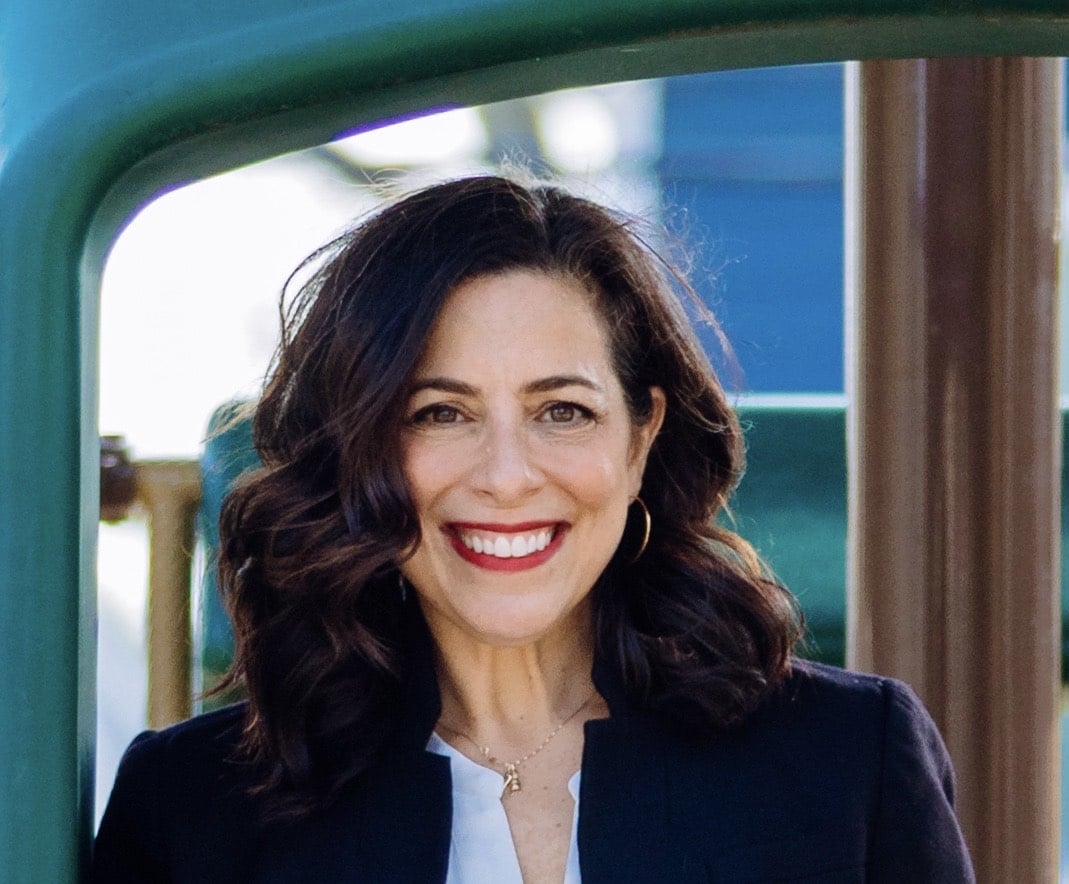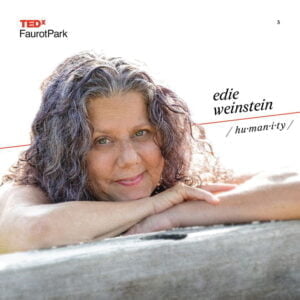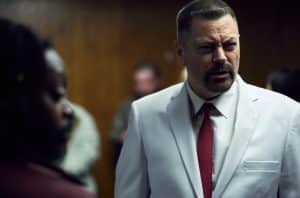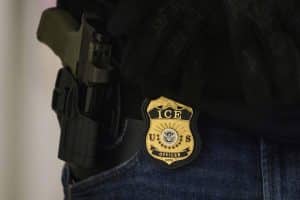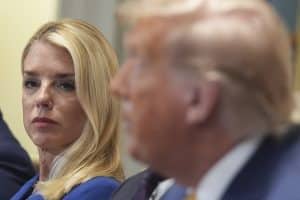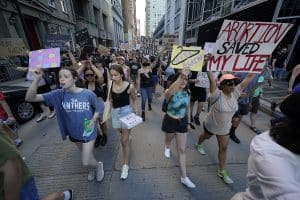A familiar presence in our community, Tabitha Dell’Angelo is a Renaissance Woman. She is an educator, actor, writer, speaker, podcast host, and spoke on the TEDx stage in Ewing, NJ, in May of 2022. Her topic was Act Your Age! How and why to play like an adult. I’m on board with that!
Tabitha just completed her role as a Central Bucks School District School Board member. A grateful community of students, staff, teachers, and parents acknowledge the tremendous commitment it took for her to serve in the face of some of the most contentious times in the district. During her term, CBSD made the news, and mostly not for positive reasons. Book banning, challenging the teaching of accurate history, threatening the rights of LGBTQ+ students and the teachers who support them made headlines in the media – both locally and nationally.
Democrats swept the school board election in November, as they now control the majority with a mandate for change given to them from voters. On day one, after their swearing in, policies were indeed changed, with plans to revisit other unpopular changes made by the Republican majority.
On your Facebook profile, you have the words, “My views are my own.” If you could give a brief rundown of some of those beliefs, what might they be?
It is funny you picked up on that. I did not always have that on my profile. But, when I started on the school board in Central Bucks, it was recommended that I do that to make it clear that I was not speaking for the board but rather anything I posted was my individual idea or perspective. I left it because it seemed like a good practice.
READ: Protecting Public Education Can Help Protect the Country from Another January 6th Insurrection
It is fair to say that I am a progressive educator. I constantly strive to recognize injustice and inequity and do what I can to support the human rights of all people by working in partnership with schools and communities.
Was being a teacher always a life plan for you?
I was absolutely not one of those people who say they always knew they wanted to teach. I have always loved science. When I was little, I was forever collecting rocks and what I imagined were fossils. I would check out books from the library so I could identify them. I loved reading biographies and would often tell people that I wanted to be the president of the United States when I grew up. In high school I continued to be drawn to science and imagined I would someday work in a lab. Also, throughout my life I would write plays, try out for performances, and enjoyed play acting and eventually “real” acting. I also spent two decades working in restaurants as a server and a bartender. As a first-generation college student from a working-class family, the idea of post-secondary education was not a straight or easy path. It took me 7 years to complete my undergraduate degree. I sometimes went full time, often went part time, and always had at least one, but often more, job while completing my degree. I ultimately think I chose teaching because I love studying and learning and teachers do that constantly, I love performing and teachers have to be “on” every day, all the time, and I needed to know that the degree in my hand equaled a job. My background did not afford me the luxury of the arts degree that I might have coveted.
What does your role as an educator mean to you?
Thinking like a researcher. The habits of mind in research are so important in teaching. Planning courses, developing lessons, and then looking closely at how those lessons land, what questions come up from students, how and what they take from any given lesson or course … all of that is extremely interesting and important to me. Being an educator means both owning and expressing professional knowledge and knowing there is always more to learn. It means planning exciting instruction and knowing that those plans might have to be tossed because in the moment with your students it is clear that the plan must change. Being an educator means truly understanding and embodying what it means to be fully inclusive so that all students know that they are valued. All of this is a constant practice. If I ever feel like I have figured it all out, I am doing something wrong.
I know you invested a great deal of time, heart, energy, and sleepless nights as a CBSD board member. How would you describe the experience now that you are on the other side of it?
A little bit sad to be honest. I first thought about running for school board almost a decade ago. Contributing to our community by sharing my passion and knowledge for teaching and learning and children was so exciting to me. When I finally got the chance to serve, I imagined sitting around the table with my colleagues, grappling with ideas, meeting teachers, and visiting their classrooms, hearing from students, creating town hall style community meetings, etc. It didn’t turn out that way. Instead, it was two years of being drawn into culture wars that were unnecessary and drew attention away from the good work that teachers were doing and what students were telling us they wanted and needed. So, while I am completely confident in this new Board, I sort of wish I could be on it. While they still will face challenges, this Board seems like one in which I could have engaged in the kind of collegial and productive work I had hoped for.
What were some of the most crucial issues that you addressed as part of the school board?
Many people know about the individual policies that we struggled with. But the most crucial issues were the overarching problems rooted in de-professionalizing teachers and other staff, and not respecting student voices. I found myself arguing [often] that we should trust the professional knowledge of teachers. That when they recommend a particular pedagogical approach, it is not for a board of people with limited (or no) expertise in education to tell them how or what to teach. It was also impossible not to notice how many students wrote to us or came out to speak publicly. They would come to the podium on a school night after waiting in line and then wait for their turn and beg us to listen to them about their experiences. One particular student came time after time to ask for student representation on the board. I loved this idea and tried to fight for it as well. I remember one night the superintendent invited this student to speak – not at the public comment podium, but in the front. The student projected his slide deck and presented his vision for student representation. At the end of his presentation everyone clapped but there was no action taken. I called for us to add student representation to the next agenda and it was shut down – while the student was standing there, two minutes after giving his presentation. It was almost unbelievable. So, while the individual policies remain important, my work was about the larger philosophy of education and respect for our students, staff, and faculty.
You are leaving the board in better hands with the newly elected members and discriminatory policies overturned. How does that feel?
Well, like I said above, I would love to serve with them. But I definitely feel confident in their ability to lead the district.
As a mother of children in the district, I know you have personal reasons for the work you have done.
My two children have had wonderful experiences here. The fact that amid all the strife, their classrooms remain ones in which they are having stellar learning experiences, and they know they are loved and valued, is a testament to our district staff. I have heard from many district employees that the day after the election felt celebratory in the schools and there was a collective sigh of relief. It is my hope that they will now feel valued and respected so that they can maintain the amazing work they already do.
All work and no play … how do you unwind in the midst of all of the responsibilities you have?
There is not a lot of time to have big fun. But I like to cook for my family on weekends (my husband does almost all the cooking during the week). We play games together when we can. We love to watch movies together too. I love my family. I also love to read and typically have one paper book and one audiobook going at any one time. Right now, I am listening to Tom Lake by Anna Patchett and reading Fix Injustice, Not Kids and Other Principles for Transformative Equity Leadership by Paul Gorski and Katy Swalwell.
I love to lift weights, practice yoga, and when I find the time and motivation again, I will start running☺. I love to dance and be silly, and just play.
I also get to travel a lot for work. I have former students all over the world who are part of a network of trusted colleagues/friends.
And I couldn’t do any of this without my husband Steve. He would talk through the toughest school board issues with me and help me see them from as many angles as we could imagine. He is an amazing dad and made it possible for me to be at very long board meetings without our children feeling abandoned, he takes care of us in so many ways. He even punches up my jokes. He’s brilliant and funny and has made everything I’ve done in the past few years possible.
One very cool thing I just learned about you is that you are a stage comic. Please tell us about that.
Ok, barely. I have done improv comedy for decades. I love doing that. I have done stand up now exactly five times. Three times about 10 years ago and twice within the past two weeks. I have also done a fair amount of storytelling on stage and enjoy that art form. Recently I have been playing around with joke writing and taking advantage of the local open mic nights. It is both terrifying and energizing.
Congrats on becoming a contributor for The Beacon with your column on education. I look forward to reading your observations.
